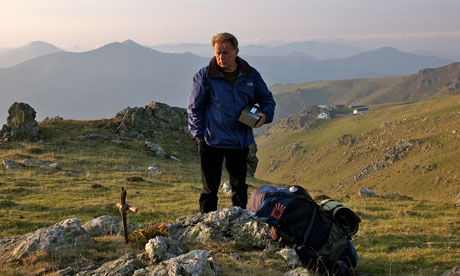
There’s a lot of talk about philosophy and films, the idea being that films can actually do philosophy, not just that films can illustrate philosophy. Well, I wonder whether The Way – directed by Emilio Estevez, starring his father Martin Sheen – might count.
First, it is a sentimental film, not layered and edgy like Hitchcock, the philosopher’s director of choice. Sheen plays an American who comes to Spain to bring home the remains of his dead son, only to discover that his son had died on the pilgrimage from the Pyrenees to the shrine of Santiago de Compostela, the Camino, the Way. He decides to do the pilgrimage for his son himself. As he walks, he picks up three other wounded souls – and I don’t suppose there was a dry eye in the cinema by the time they reach their destination. And it seemed to me that the film did do some philosophy of religious experience in an interesting way too.
For one thing, the pilgrims are all religiously-indifferent, if not atheistic, and yet the journey touches them. The priority of experience over doctrinal belief is enacted. In fact, it’s not clear that any of them are any more Christian by the end, though they clearly learn to trust the unexpectedness of what happens, to find faith.
The irrationality of the pilgrimage process is depicted throughout too, from the careful collection of passport stamps to the ludicrous swinging of the gigantic thurible in the cathedral at Compostela. This spoke of how the reconciliation they seek is not a rational process. If it was, they could have sat down and worked it out, not had to walk the hundreds of miles.
There were lots of other little details – how they are all rather unlikeable characters as a result of acting out their private agonies; how a kind of violence between them preceded any warming of hearts; how none of the explicit goals for the walk (losing weight, quitting cigarettes) were achieved but that what emerged was a new inner possibility.
It is nicely done. I’d recommend it.